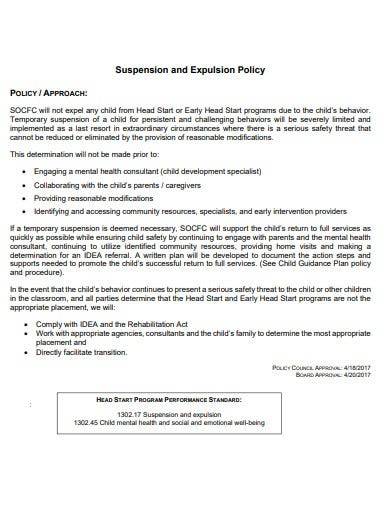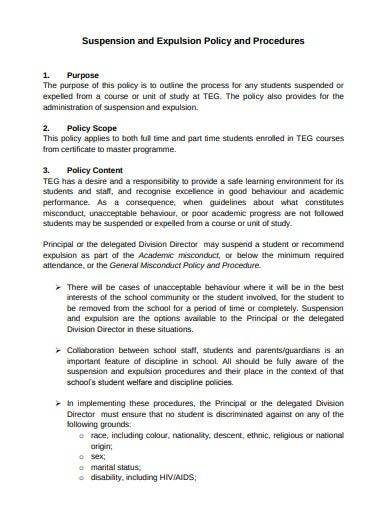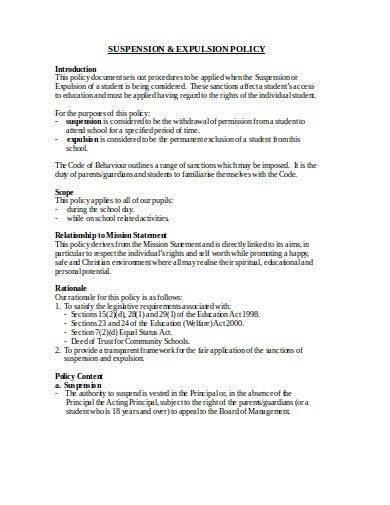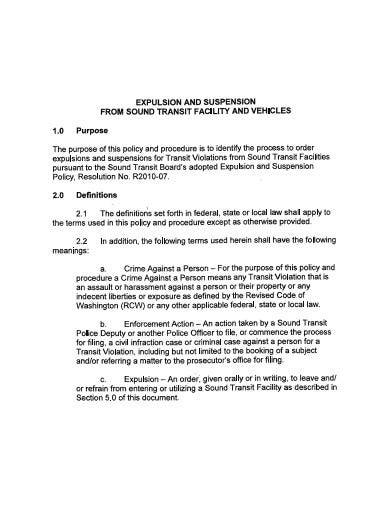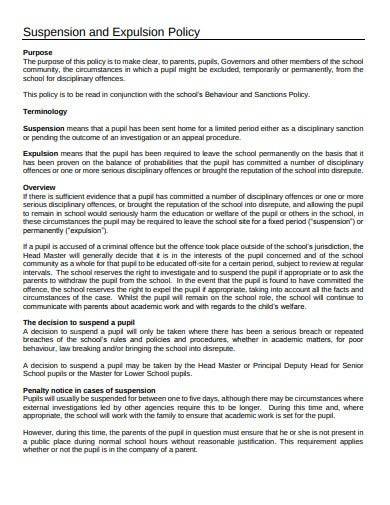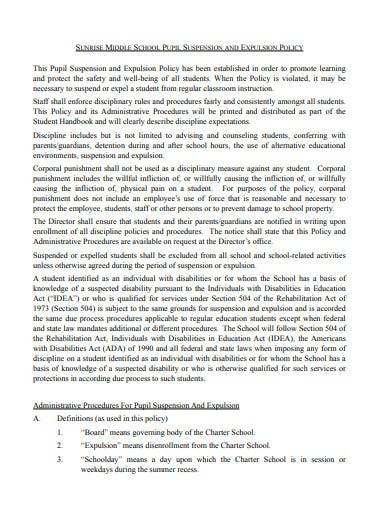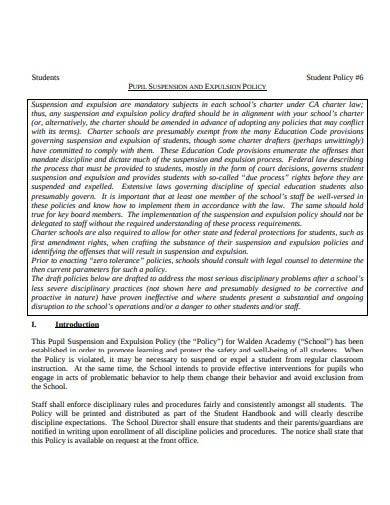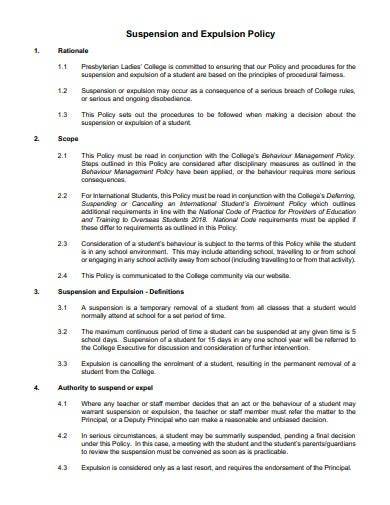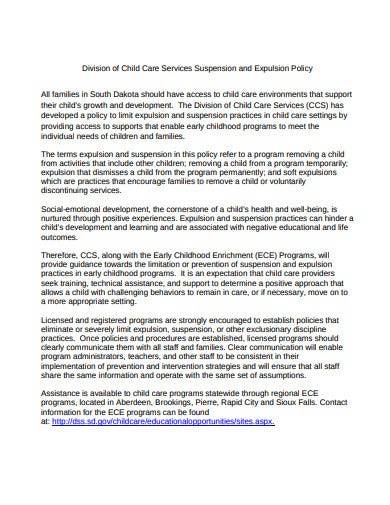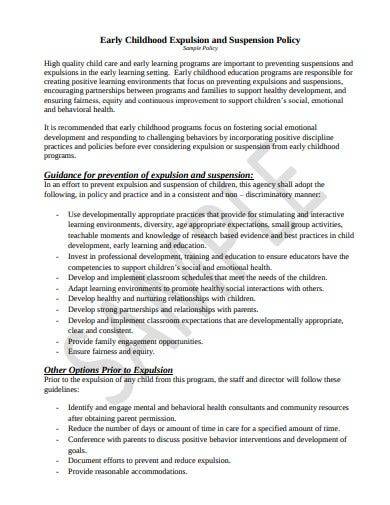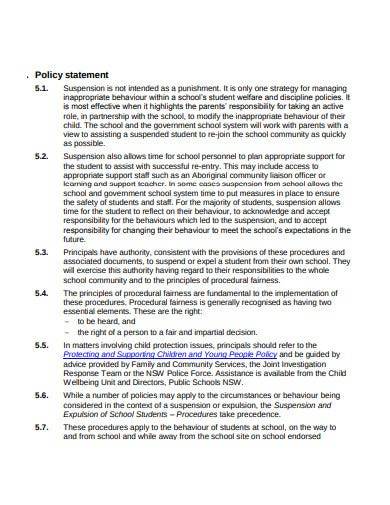Suspension is a temporary removal of a student from school or class list for a specific period, while expulsion is a more severe disciplinary action plan that permanently removes a student from school. Both suspension and expulsion policies are necessary to ensure that students are held accountable for their action item and that the school maintains a safe and positive learning environment.
FREE 10+ Suspension And Expulsion Policy Samples
1. Suspension and Expulsion Policy Template
2. Suspension and Expulsion Policy and Procedure
3. Sample Suspension and Expulsion Policy
4. Suspension and Expulsion Policy Sample
5. Suspension and Expulsion Policy Format
6. Pupil Suspension and Expulsion Policy
7. Sample Pupil Suspension and Expulsion Policy
8. Basic Suspension and Expulsion Policy
9. Child Care Service Suspension and Expulsion Policy
10. Early Childhood Suspension and Expulsion Policy
11. Suspension and Expulsion Policy Statement
What is Suspension And Expulsion Policy?
Suspension and expulsion policies are a set of policy and procedures that schools, colleges, and universities use as strategic action plan to discipline students who violate school rules or engage in unacceptable behavior. These policies are designed to ensure that students follow the school’s code of conduct and maintain a safe and productive learning environment for all students.
How To Make Suspension And Expulsion Policy?
It is important to note that suspension and expulsion policies should be fair and impartial, and should be implemented in a way that promotes the well-being and academic career development plan of all students. The policies should also be communicated clearly to students and their families to ensure that they understand the consequences of violating school rules. Creating a suspension and expulsion policy for a school, college, or university is an essential step towards maintaining a safe and productive learning environment. Here are some steps to follow when making a suspension and expulsion policy:
Step 1- Determine the Scope
The first step is to determine the procedure scope of work. Identify which students the policy applies to, such as full-time students, part-time students, or students who participate in extracurricular activities. Next, identify the types of behavior that can result in disciplinary action. These may include bullying, harassment, violence, drug use, theft, or other types of misconduct.
Step 2- Establish Disciplinary Process
The disciplinary process should be clear and well-defined. It should include the steps taken when a violation is reported, how the violation will be investigated, and how the punishment will be determined. The consequences of violating the school’s code of conduct should be clearly stated in the policy. These may include suspension, expulsion, or other disciplinary actions.
Step 3- Establish Appeal
Students should have the right to appeal disciplinary actions. The policy should include the process for appealing a decision and the timeframe for submitting an appeal. The policy should also include guidelines for providing support and counseling to students who have been suspended or expelled. This may include referrals to mental health professionals, academic support, or other resources.
Step 4- Communicate Policy
The policy should be communicated clearly to students and their families, faculty and staff members, and other relevant stakeholders. It should be easily accessible and understandable. The policy should be reviewed regularly to ensure that it is up-to-date and effective. Feedback samples from students, faculty, and staff should be taken into account when updating the policy.
What are the consequences of violating a school’s suspension and expulsion policy?
Consequences may include suspension, expulsion, or other disciplinary actions.
What types of behavior can result in disciplinary action under a suspension and expulsion policy?
Behaviors that can result in disciplinary action may include bullying, harassment, violence, drug use, theft, or other types of misconduct.
Can students appeal a disciplinary decision under a suspension and expulsion policy?
Yes, students usually have the right to appeal a disciplinary decision. The policy should include the process for appealing a decision and the timeline outline for submitting an appeal.
By following these steps, schools, colleges, and universities can create a suspension and expulsion policy that promotes a safe and productive learning environment and provides clear guidelines for disciplinary action.
Related Posts
FREE 10+ Concurrent Class Policy Samples & Templates in MS Word | PDF
FREE 10+ Bullying Policy Samples in MS Word | PDF
FREE 10+ Administration of Medication Policy Samples & Templates in MS Word | Google Docs | Pages | PDF
FREE 9+ Sample Delivery Policies in PDF
FREE 10+ Fiscal Policy Samples in PDF | DOC
FREE 3+ Expansionary Policy Samples in PDF | DOC
FREE 10+ Construction HR Policy Samples in MS Word | Google Docs | PDF
FREE 13+ Website Privacy Policy Samples in MS Word | Apple Pages | PDF
FREE 20+ Open Door Policy Samples in PDF
FREE 20+ Observation Policy Samples in PDF | MS Word
FREE 15+ Construction Safety Policy Samples in MS Word | Google Docs | PDF
FREE 20+ Student Feedback Policy Samples in PDF
FREE 30+ Fee Policy Samples in PDF | MS Word
FREE 29+ Work Policy Samples in PDF
FREE 20+ Recruitment Policy Samples in PDF

